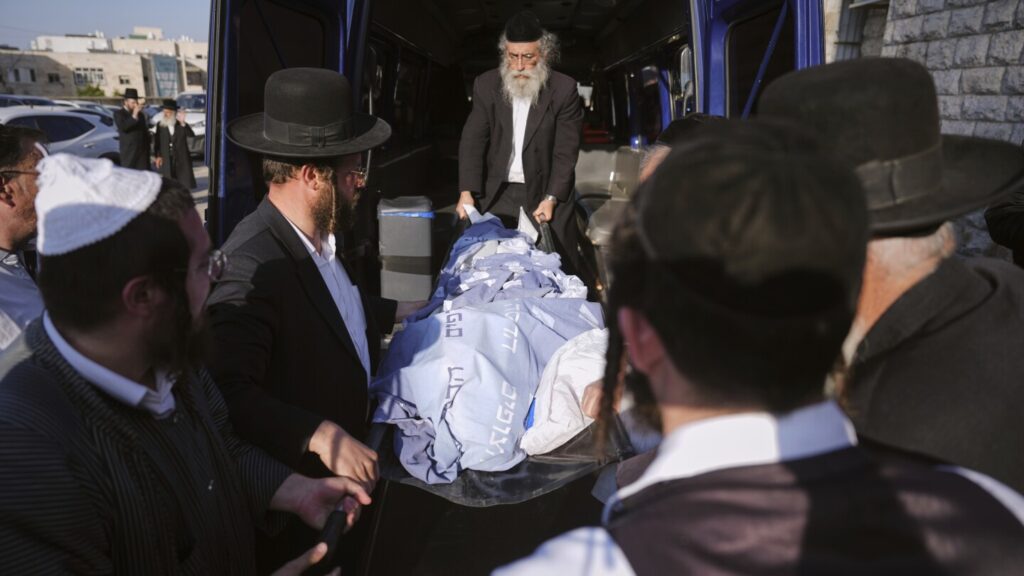DEIR AL-BALAH, Gaza Strip (AP) — Israel struck and destroyed another high-rise building in Gaza City on Monday after warning residents to evacuate, part of an offensive aimed at taking over the largest Palestinian city. The military said it was targeting Hamas observation posts and bombs placed around the 12-story office building.
Over the past several days, Israel has destroyed multiple high-rise buildings in Gaza City, accusing Hamas of putting surveillance infrastructure in them. It has ordered people to flee ahead of its ground offensive into the city of some 1 million residents, which experts say is experiencing famine.
U.S. President Donald Trump said that he was giving his “last warning” to Hamas regarding a possible ceasefire, as Arab officials described a new U.S. proposal for the immediate release of all the remaining hostages in exchange for 3,000 Palestinians and a temporary ceasefire.
In Jerusalem, meanwhile, two Palestinian gunmen opened fire at a bus station, killing six people and wounding 12 in the worst such attack on Israelis in nearly a year. Tensions have soared across Israel and the occupied West Bank in the two years since Hamas’ Oct. 7 attack out of Gaza ignited the war.
Gaza’s Health Ministry said hospitals received the bodies of 65 people killed by Israeli fire over the past 24 hours, with another 320 people wounded.
‘Last warning’ proposal
Israeli Foreign Minister Gideon Saar confirmed that Israel had accepted the latest U.S. proposal during a news conference in Hungary and expressed hope it would succeed.
Hamas said in a statement late Sunday that it was “ready to sit at the negotiating table” regarding the proposal from U.S. Mideast envoy Steve Witkoff. The smaller Islamic Jihad militant group, which also holds hostages, said it too would consider the proposal.
The “last warning” proposal, presented by Witkoff, calls for a negotiated end of the war and the withdrawal of Israeli forces from Gaza once the hostages are released and a ceasefire is established, according to officials familiar with the talks.
The prisoner exchange would include hundreds of Palestinians serving life sentences, added the officials from Hamas, Islamic Jihad and Egypt, who all spoke on the condition of anonymity to discuss closed-door talks. Details of the proposal were first reported by Axios.
A Hamas official said the militant group was studying the proposal with other Palestinian factions and would respond within days. He said they will demand a “clear commitment” that the war will end before releasing the hostages.
An Egyptian official said the new proposal, which Arab mediators received from the U.S., was broader than previous ones and would require negotiations over ending the war, the withdrawal of Israeli forces and Israel’s demand that Hamas disarm.
Dispute over war’s end has stymied ceasefire efforts
Hamas-led militants abducted 251 people in the Oct. 7 attack and killed some 1,200, mostly civilians. Forty-eight hostages are still inside Gaza, around 20 of them believed to be alive.
Israel’s retaliatory offensive has killed at least 64,522 Palestinians, according to Gaza’s Health Ministry, which does not say how many were civilians or combatants. It says around half of those killed were women and children. Large parts of major cities have been completely destroyed, and around 90% of the population of some 2 million Palestinians have been displaced.
Hamas has said it will only return the remaining hostages — its only bargaining chip — in exchange for Palestinian prisoners, a lasting ceasefire and a full Israeli withdrawal from Gaza. It says it is willing to hand over power to politically independent Palestinians.
Israeli Prime Minister Benjamin Netanyahu has rejected those terms, saying the war will continue until all the hostages are returned and Hamas has been disarmed. He says Israel will maintain open-ended security control over Gaza and facilitate what he describes as the voluntary emigration of much of its population, which the Palestinians and many others see as a plan for forcible expulsion.
Mediators had previously focused on brokering a temporary ceasefire and the release of some hostages, with the two sides then holding talks on a more permanent truce. Witkoff walked away from those talks in July, after which Hamas accepted a proposal that the mediators said was almost identical to an earlier one that Israel had approved.
___
Lidman reported from Jerusalem and Magdy from Cairo.
___
Follow AP’s war coverage at https://apnews.com/hub/israel-hamas-war

